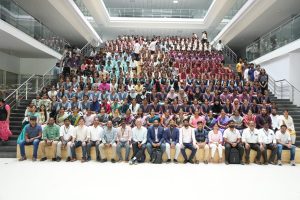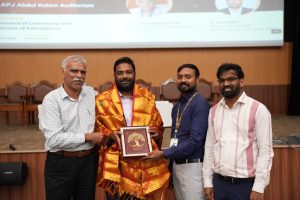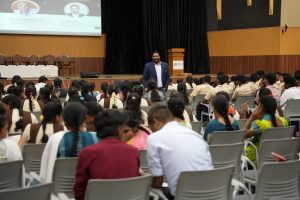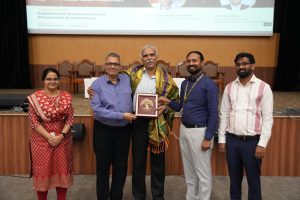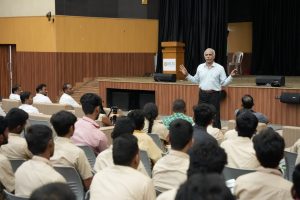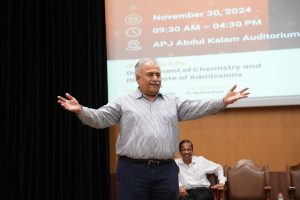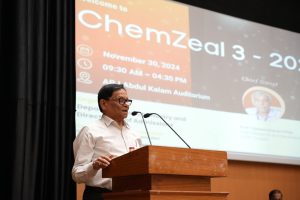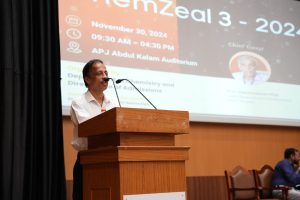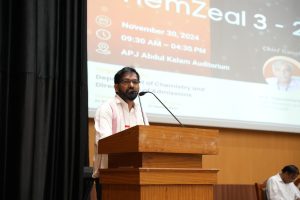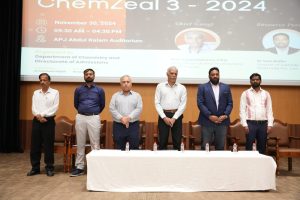SRM-AP All News
ALL News
- Inspiring Future Chemists at ChemZeal 3 December 3, 2024
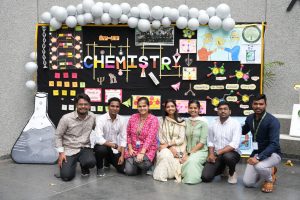 On November 30, 2024, the Department of Chemistry, in collaboration with the Directorate of Admissions, hosted ChemZeal 3, a flagship event that showcased the ever-expanding scope of chemistry in today’s world. The event was graced by prominent personalities, including the Chief Guest, Prof. Vijayamohanan Pillai, Dean of Research & Development at IISER Tirupati, and Dr Veerababu, Director of Cathode, GODI India Pvt. Ltd., Hyderabad, who served as the resource person.
On November 30, 2024, the Department of Chemistry, in collaboration with the Directorate of Admissions, hosted ChemZeal 3, a flagship event that showcased the ever-expanding scope of chemistry in today’s world. The event was graced by prominent personalities, including the Chief Guest, Prof. Vijayamohanan Pillai, Dean of Research & Development at IISER Tirupati, and Dr Veerababu, Director of Cathode, GODI India Pvt. Ltd., Hyderabad, who served as the resource person.The event began with a welcome address by the convener, Dr Satheesh Ellipilli, who provided an insightful overview of the programme and reflected on the immense success of the previous editions, ChemZeal 1 and 2. He expressed excitement about the growth of the event and its contribution to advancing the knowledge and application of chemistry in various fields.
Following the welcome, the Head of the Department of Chemistry delivered an inspiring speech, offering a comprehensive overview of the department. Dr Pardha Saradhi Maram, Associate Professor and Head highlighted the department’s commitment to academic excellence, research innovation, and fostering an environment where students can explore the transformative power of chemistry.
One of the major highlights of the event was the launch of the “Post a Q” portal by Vice Chancellor, Prof. Manoj K Arora. The portal aims to provide a platform for students and researchers to ask questions and seek solutions in the realm of chemistry. During the launch, Prof. Arora remarked, “Chemistry is such a wonderful science that, no matter what you think of, you will find chemistry in it.” This statement underscored the far-reaching impact of chemistry on everyday life and innovation.
The keynote address by the Chief Guest, Prof. Vijayamohanan Pillai, focused on generating and storing clean energy. He discussed the pivotal role that chemistry plays in developing sustainable solutions for energy storage and generation, from battery technologies to renewable energy sources. Prof. Pillai’s talk resonated with the audience, particularly in the context of the growing need for clean energy in the face of global environmental challenges.
The resource person, Dr Veerababu, shared valuable insights into cathode materials and their applications in the energy sector. His expertise in battery technology and his role at GODI India added depth to the discussions, providing students and faculty with a practical perspective on the industry’s current advancements.
ChemZeal 3 successfully fostered a spirit of collaboration and intellectual curiosity, highlighting the dynamic nature of chemistry and its potential to address some of the world’s most pressing issues. The event concluded with a vote of thanks, acknowledging the contributions of all the speakers, participants, and organisers who made the day a resounding success.
Continue reading → - Research on Vehicle Density Detection Granted a Patent December 3, 2024
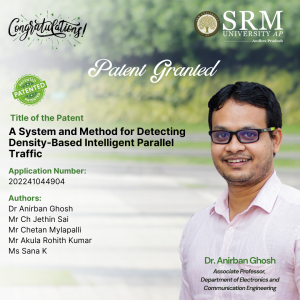 Research Scholars Chetan Mylapilli, Jethin Sai Chilukuri, Rohith Kumar Akula, Sana Fathima, and Assistant Professor Dr Anirban Ghosh from the Department of Electronics and Communication Engineering at SRM University-AP have co-authored an innovative paper titled “A System and Method for Detecting Density-Based Intelligent Parallel Traffic.” This pioneering research delves into the development of an intelligent traffic control system that dynamically adjusts traffic signals based on real-time vehicle density analysis, their research with the patent no- 202241044904 represents a significant step in integrating technology with transportation efficiency.
Research Scholars Chetan Mylapilli, Jethin Sai Chilukuri, Rohith Kumar Akula, Sana Fathima, and Assistant Professor Dr Anirban Ghosh from the Department of Electronics and Communication Engineering at SRM University-AP have co-authored an innovative paper titled “A System and Method for Detecting Density-Based Intelligent Parallel Traffic.” This pioneering research delves into the development of an intelligent traffic control system that dynamically adjusts traffic signals based on real-time vehicle density analysis, their research with the patent no- 202241044904 represents a significant step in integrating technology with transportation efficiency.Abstract
This work presents an intelligent traffic control system that addresses the gaps in the current state-of-the-art by using a novel hardware-software integration. The system evaluates traffic density in each lane direction and dynamically adjusts traffic lights using a computational algorithm to significantly reduce waiting times at junctions. It also ensures safe pedestrian movement and enables parallel traffic flows. A Raspberry Pi serves as the system’s control unit, utilizing video processing to determine traffic density, while LEDs simulate the traffic lights. The system integrates various hardware and software components, including Raspberry Pi, LEDs, relay modules, VNC software, and sample traffic videos, to provide an efficient solution to the traffic management problem.
Explanation of Research in Layperson’s Terms
The current system uses a Raspberry Pi to control traffic lights based on real-time video of cars at intersections. It detects how many vehicles are in each lane and adjusts the lights to reduce waiting time. Pedestrian safety is managed by ensuring safe crossing times. LED lights simulate the traffic signals, and the system allows smoother traffic flow by handling vehicles moving in parallel. However, it can’t yet control turning vehicles or prioritize emergency vehicles.
Practical Implementation of the Research
The intelligent traffic control system significantly reduces congestion by dynamically adjusting traffic signals, leading to shorter wait times and smoother commutes. It helps lower pollution and fuel consumption by minimizing idle time at junctions, contributing to better air quality and conservation of resources. Pedestrian safety is improved through designated crossing times, reducing accidents. The system also supports economic growth by cutting time wasted in traffic, enhancing productivity.
Future Research Plans
Future research will focus on adding control for turning traffic and distinguishing between different vehicle types to enable emergency vehicle priority. To improve real-time video processing, the system will transition from Raspberry Pi to more efficient hardware like FPGAs or GPUs. Machine learning will be explored for better vehicle detection and traffic signal optimization. Integration with V2X communication will enhance traffic management, and real-world scalability will be tested for deployment in smart city environments.
The prototype:
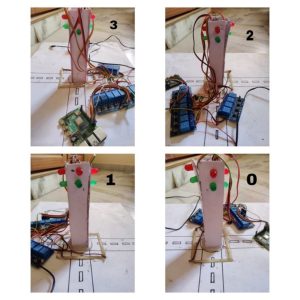
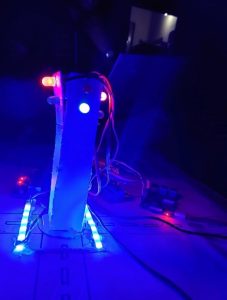
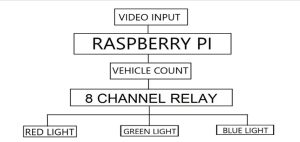
Figure 1. Image of the prototype
Figure 2. Working prototype
Figure 3. Block Diagram of the prototype
Continue reading → - Faculty Collaborate on Interdisciplinary Innovation December 3, 2024
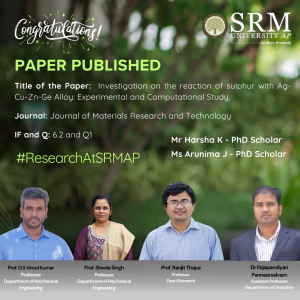 In an inspiring collaboration, Prof. G S Vinod Kumar and Prof. Sheela Singh from the Department of Mechanical Engineering, Prof. Ranjit Thapa from the Department of Physics, and Dr Rajapandiyan Panneerselvam from the Department of Chemistry at SRM University – AP, along with PhD scholars Ms Harsha K and Ms Arunima J, have co-authored a compelling paper titled “Innovative Approaches to Enhancing the Tarnish Resistance of Silver Alloys.” This groundbreaking research focuses on developing new silver alloys that resist tarnishing, enhancing durability and aesthetic appeal for applications in the jewellery industry. Together, they are paving the way for innovative solutions that blend science with artistry.
In an inspiring collaboration, Prof. G S Vinod Kumar and Prof. Sheela Singh from the Department of Mechanical Engineering, Prof. Ranjit Thapa from the Department of Physics, and Dr Rajapandiyan Panneerselvam from the Department of Chemistry at SRM University – AP, along with PhD scholars Ms Harsha K and Ms Arunima J, have co-authored a compelling paper titled “Innovative Approaches to Enhancing the Tarnish Resistance of Silver Alloys.” This groundbreaking research focuses on developing new silver alloys that resist tarnishing, enhancing durability and aesthetic appeal for applications in the jewellery industry. Together, they are paving the way for innovative solutions that blend science with artistry.Abstract
Silver and its alloys undergo tarnishing with time, which is a black stain on the surface due to the formation of Ag2S. Developing a tarnish resistant Ag alloy was attempted by alloying Ag with elements that form a passive oxide layer on the surface. Germanium is proven to provide better tarnish resistance to sterling silver alloy (92.5wt.% pure) which is available under the trade name of Argentium©. The present work investigates the tarnish resistance behaviour of sterling silver alloy (92.5wt.% pure) containing various additions of Copper, Zinc, Germanium, Aluminium, Beryllium, Titanium, Zirconium, and Magnesium. The alloys were prepared by melting and casting route, followed by Passivation Heat Treatment (PHT) to create a stable and continuous oxide layer. The temperature for PHT was optimized using thermogravimetry analysis (TGA) of the alloys prepared. An accelerated tarnish test was carried out to investigate the tarnishing behaviour of alloy samples obtained before and after PHT. The samples were characterized using XRD, SEM-EDX, TG-DSC, micro-Raman Spectroscopy, and XPS. The change in reflectance of the samples after the tarnish test is determined using UV-visible reflectance spectroscopy. The mechanism behind the tarnish resistance was derived using Density Functional Theory (DFT) by comparing sulphur (S2) and Oxygen (O2) adsorption energies (BE) of the alloying elements.
Explanation of the Research in layperson’s terms
Age-old silver pieces are found in different colours ranging from light yellow(silver Jewellery pieces after a few weeks of usage) to black(archaeological silver pieces). They look different in terms of the metallic white colour and lustrous appearance from fresh silver. This demeans silver and thus affects its market. The major cause of the staining of silver is the interaction of individual silver particles with some elements found common in the atmosphere. We work on the prevention of this staining of silver. For the study, silver is incorporated with other elements which makes silver less interacting with staining elements in the atmosphere. These additional elements create a layer over silver so that it is protected. The appropriate elements are identified by using modelling using computer software. After obtaining appropriate elements, the experimental trials are also done with the same elements until stainless silver is obtained. Then, what happens to the added elements inside silver is also studied by using modern microscopic technics.
Practical/Social Implications of the Research
The major application of the invention is in the jewellery industry. The problem of tarnishing is an age-old threat in jewellery making. The alloys we proposed could be used to make quality silver jewellery/articles that can sustain the colour and lustre for a longer period. This will stop the hesitation from jewellery designers and industries to try intricate designs in silver and find a better market for them. The alloys based on the proposed composition show good grain refinement and thus high hardness. This strengthens the soft silver and improves the range of its applications from low hardness articles to high. The alloys based on the proposed composition have high tensile strength. They deform plastically for a wide range of stress values and will not break easily.
Collaborations:
Waman Hari Pethe & Sons Jewellery
Future Research Plans:
1. Corrosion studies of silver alloys to understand the behaviour in solutions having compositions similar to that of sweat.
2. Study of mechanical properties of silver alloys to develop workable alloys of sterling silver which could be used for jewellery manufacturing
3. Identification of elements having better oxide layer formation when alloyed with silver, by using computational techniques and experimental studies of their properties.
Link to the article:
Continue reading →
https://www.sciencedirect.com/science/article/pii/S2238785424024633 - Patent Published on Segmentation of Kidney Abnormalities November 29, 2024
 Prompt and timely disease detection forms an essential part of any treatment, Dr Pradyut Kumar Sanki, Dr Swagata Samanta, and research scholar Ms Pushpavathi Kothapalli from the Department of Electronics and Communication Engineering have worked towards a timely and accurate disease detection when it comes to kidney disease diagnosis through medical images. Their innovative research titled, “A System and a Method for Automated Segmentation of Kidney Abnormalities in Medical Images” has been published in the patent journal with Application No. 202441074765 and has significant potential for clinical adoption, improving patient care in kidney disease detection and treatment.
Prompt and timely disease detection forms an essential part of any treatment, Dr Pradyut Kumar Sanki, Dr Swagata Samanta, and research scholar Ms Pushpavathi Kothapalli from the Department of Electronics and Communication Engineering have worked towards a timely and accurate disease detection when it comes to kidney disease diagnosis through medical images. Their innovative research titled, “A System and a Method for Automated Segmentation of Kidney Abnormalities in Medical Images” has been published in the patent journal with Application No. 202441074765 and has significant potential for clinical adoption, improving patient care in kidney disease detection and treatment.Abstract:
This research work aimed to develop an effective method for segmenting kidney diseases, including kidney stones, cysts, and tumours. The method achieved high accuracy in segmenting kidney diseases, with a good mean precision, and recall. The study employed techniques to efficiently select the most relevant features for kidney disease segmentation, identifying key features related to imaging and patient health. The method outperformed other approaches in terms of accuracy, precision, and recall. The study utilized a comprehensive dataset of kidney disease patients to train and test the segmentation method effectively. The results suggest that this method has the potential to be widely adopted in clinical settings, contributing to more accurate and efficient diagnostic tools for kidney disease segmentation and improving patient care in an effective manner.
Practical Implementation:
The practical implementation of the research involves deploying a system for real-time segmentation of kidney diseases, including kidney stones, cysts, and tumours. The method achieved high accuracy in segmenting kidney diseases using deep learning techniques. The model can quickly identify and delineate diseased areas within the kidney. The study employed techniques to select the most relevant features for kidney disease segmentation, focusing on key imaging and health-related characteristics. The method outperformed other approaches in terms of accuracy, precision, and recall. The study utilized a comprehensive dataset of kidney disease patients to train and test the segmentation method. The results suggest that the method has the potential to be widely adopted in clinical settings, contributing to more accurate and efficient diagnostic tools for kidney disease segmentation and improving patient care.
Future Research Plans:
The future plans for the work on chronic kidney disease (CKD) detection and segmentation involve several key areas:
Expanding Disease Coverage: Future research could involve adapting and expanding the segmentation model to detect and segment other kidney-related abnormalities and diseases, such as renal infections or congenital disorders, thereby increasing the versatility and applicability of the tool.
Improving Model Accuracy and Robustness: To further improve accuracy, additional deep learning techniques, such as ensemble learning or advanced attention mechanisms, could be explored. Testing on larger and more diverse datasets could help make the model more robust and generalizable across various patient demographics and imaging devices.
Integration with Multi-modal Data: Incorporating other data types, such as blood test results, genetic markers, or electronic health records, could be an exciting avenue to explore. This would create a multi-modal approach, combining imaging data with clinical information, potentially improving diagnostic accuracy and providing more comprehensive insights into kidney health.
Real-world Clinical Trials: Conducting clinical trials in real-world settings to validate the effectiveness of the segmentation tool with healthcare professionals. Gathering feedback from these trials would provide valuable insights into user experience and model performance, facilitating further refinement.
Developing a User-friendly Interface: Future work could involve creating an easy-to-use interface that seamlessly integrates with hospital systems. This interface would allow healthcare providers to interact with the segmentation results, adjust parameters, and view comprehensive diagnostic reports.
Exploring Semi-supervised and Unsupervised Learning Approaches: To reduce the reliance on labeled data, which can be time-consuming to obtain, exploring semi-supervised or unsupervised learning techniques could be beneficial. These approaches might help in training the model on large datasets without extensive labeling, thereby improving scalability.
Longitudinal Studies for Prognostic Analysis: Research could also focus on tracking patients over time to understand how kidney disease progresses and how segmentation results correlate with long-term health outcomes. This could help in creating predictive models for disease prognosis.
Continue reading →
- Patent on IoT System for Sensor Data Monitoring and Geo-Storage November 29, 2024

Prof. Rupesh Kumar from the Department of Electronics and Communication Engineering and his research cohort, Mr Venkata Naga Sai Kiran Damarla, Mr Prasannakumar Seelam, Ms V L S Tanmay P, and Mr Venkata Ramana Murthy Pondala (BTech ECE students), has published a patent titled “An Integrated Iot System for Sensing, Monitoring, and Geo-Information Storage of Sensor Data” with Application No: 202441065318 for their breakthrough research on developing an intelligent IoT system that can detect environmental changes.
Abstract
This research presents an integrated IoT system designed to monitor environmental conditions and store the corresponding data along with geo-information. The system autonomously collects data from its surroundings, processes it, and stores the information for future retrieval. The system is designed for use in remote monitoring applications where consistent tracking of environmental variables and location data is essential.
Explanation of the Research in Layperson’s Terms
The project aims to create a smart system that can sense changes in its environment—like temperature or humidity—and record those changes alongside its current location and time stamp. The collected data is stored so that it can be retrieved later for analysis, making the system useful in situations like monitoring climate conditions in farming or tracking environmental changes in various locations.
Practical Implementation/Social Implications of Research
The practical implementation of this system spans various fields such as agriculture, environmental management, and logistics. For example, in agriculture, the system can help farmers track environmental changes, allowing them to optimize crop management. Similarly, it can monitor environmental conditions in remote areas, ensuring timely interventions when necessary. The system could also aid in asset tracking, providing both environmental data and the location of critical resources. Its broader social impact lies in its ability to automate data collection, improve accuracy, and reduce human intervention in critical monitoring tasks.

Collaboration
This project was completed with the support and guidance of the Wireless Sensing & Imaging (WSI) Lab. The research team worked closely within the lab to develop the system, utilising the lab’s resources and expertise to achieve the research goals. There were no external collaborations involved in this project.
Prof. Rupesh and his team plan to explore radar design and focus on working with radar technology in their future research. By developing and integrating radar systems, the team aims to enhance IoT applications with advanced sensing capabilities, such as distance measurement, object detection, and environmental monitoring. Their goal is to contribute to more accurate and reliable solutions through the implementation of IoT Integrated Radar technology.
Continue reading → - A Grand Book Exhibition Successfully Concludes at SRM AP November 29, 2024

The Central Library hosted a highly successful Book Exhibition from November 21 – 23, 2024 in collaboration with Shah Books House (Hyderabad), Shanthi Book House (Chennai), and ISKCON Society (Vijayawada). The exhibition offered a wide range of books covering academic references, research materials, and general interest genres, catering to students, faculty, and staff. Special discounts were available to attendees, making this event an enriching experience for everyone involved.
Our exhibition was inaugurated by Dr Vinayak Kalluri, Dean – Academic Affairs and Prof. C V Tomy, Dean – SEAS in the presence of Vice Chancellor Prof. Manoj K Arora, who praised the exhibition’s ability to promote reading habits and encourage academic curiosity among students and faculty alike. Over 500 attendees, including students, faculty members, and visiting scholars, enthusiastically participated, all of whom explored the rich collection of books on display.
The collaboration with the partnering organisations ensured that the needs of the academic community were met, with resources spanning across disciplines, research interests, and general reading preferences. Many students highlighted the wide variety of books available, extending beyond the core curriculum and including topics catering to their interests and career goals. Faculty members appreciated the opportunity to recommend books for future acquisitions, ensuring the library remains up-to-date with the latest academic trends and resources.
The 2024 Book Exhibition was a resounding success, fostering a deeper connection to reading within the SRM University-AP community. The collaborative efforts of the vendors and ISKCON Society, along with the enthusiastic participation of students and faculty, made this a memorable event. Moving forward, the university plans to expand future exhibitions by incorporating more digital reading resources and hosting guest speakers to enhance the experience further.
Continue reading → - Research on Real-Time Detection and Classification of Defects in PCBAs November 28, 2024
 In today’s fast-paced technological world, ensuring the quality and reliability of electronic devices is essential. Associate Professor Dr Ramesh Vaddi and his research Scholar Mr Vinod Kumar Ancha from the Department of Electrical and Electronics Engineering introduce an innovative system for real-time detection and classification of defects in PCBAs, leveraging advanced machine learning techniques. Their research titled, “System And Method For Real-Time Detection And Classification of Defects in Assembled Printed Circuit Boards (PCBA)” was published in the Patent Journal with Application number 202441045761.
In today’s fast-paced technological world, ensuring the quality and reliability of electronic devices is essential. Associate Professor Dr Ramesh Vaddi and his research Scholar Mr Vinod Kumar Ancha from the Department of Electrical and Electronics Engineering introduce an innovative system for real-time detection and classification of defects in PCBAs, leveraging advanced machine learning techniques. Their research titled, “System And Method For Real-Time Detection And Classification of Defects in Assembled Printed Circuit Boards (PCBA)” was published in the Patent Journal with Application number 202441045761.Abstract:
This study presents a new system for real-time detection and classification of defects in Assembled Printed Circuit Boards (PCBAs), which are critical in electronic products and systems. It employs an efficient model with pretrained weights to detect defects for enhanced quality control. The model is initially trained and fine-tuned on a computer, then deployed on a compact computing board. For real-time imaging, a high-definition USB camera is connected to the system, allowing direct defect identification without the need for external devices. The output is shown on a monitor, with the PCBA image featuring clearly labeled boxes to indicate the type and location of defects. This method offers a streamlined approach to defect classification, helping to improve the quality control process in electronics manufacturing.
Explanation of the Research in layperson’s terms:
This research focuses on finding defects or flaws in Assembled Printed Circuit Boards (PCBAs). Which are the “backbone” of most electronic devices, like computers and phones. This system uses a powerful computer model to “look” at these boards and quickly identify any defects, like missing holes, mouse byte, open circuit, short circuit, spur and spurious copper in real-time. The research starts by training this model using a deep learning object detection model on a regular computer, teaching it to recognize what a normal PCBA looks like and what various defects might look like. Once it’s ready, we transfer the model to a small, efficient computer edge board, which does all the processing. A camera is used to capture images of the PCBAs, and the system analyzes these images to find respective defects. The results are displayed on a screen, where it clearly marks where the defects are and what kind of defects they are. Overall, this system helps companies detect defects in their electronics manufacturing process quickly and accurately, which can save time, reduce waste, and improve the quality of their products.
Practical Implementation:
The practical implementation of our research involves deploying a system for real-time detection and classification of defects in Assembled Printed Circuit Boards (PCBAs) a crucial component in nearly all electronic devices. By using advanced Deep learning techniques, our system can quickly identify manufacturing defects, allowing electronics manufacturers to detect the defect early in the production process. This can lead to significant improvements in quality control, reduced waste, and lower production costs. By improving quality control in electronics manufacturing, the system can help reduce electronic waste, which is a significant environmental concern. Early detection of defects also reduces the chances of faulty electronic products reaching consumers, thereby improving safety and reducing the need for product recalls. Additionally, the efficiency and accuracy of our system could lead to more reliable electronics, contributing to greater consumer trust in electronic products. This, in turn, could encourage companies to invest in higher-quality manufacturing processes, ultimately leading to a more sustainable and responsible electronics industry.
Collaborations:
To develop our system, we first trained a computer model to recognize defects in Assembled Printed Circuit Boards (PCBAs). This training process involved feeding the model a large dataset of PCBA images, some with defects and some without. By analyzing these examples, the model learned to identify common defects, like Missing hole, mouse byte, open circuit, short circuit, Spur and Spurious copper. Once the model was trained, we implemented it in a real-time setting. This meant integrating it with equipment that could inspect PCBAs as they were being produced. The system used a camera to capture images of each PCBA and then applied the trained model to analyze those images, checking for any defects. With the model running in real-time, the system could immediately detect issues and alert the manufacturing team, allowing them to correct problems on the spot. This approach helped improve the quality of the final product and reduced the chances of defective electronics reaching consumers. It also sped up the quality control process and reduced waste, making the entire manufacturing process more efficient.
Future Research Plans:
Our future research plans focus on enhancing and expanding our system for defect detection in Assembled Printed Circuit Boards (PCBAs):
Model Optimization: We aim to further refine our machine learning model to improve accuracy and speed. This includes experimenting with different architectures and training techniques to boost performance.
Expanded Defect Library: We plan to gather a more extensive dataset of PCBA defects, allowing our model to identify a wider range of issues. This will make the system more versatile and capable of handling various manufacturing environments.
Real-World Testing: We intend to test our system in a broader range of manufacturing settings to ensure its robustness and adaptability. This will help us understand how it performs in diverse real-world scenarios and how we can fine-tune it for optimal results.
Integration with Manufacturing Systems: Our goal is to integrate our system with other manufacturing processes and technologies. This will allow for seamless communication between defect detection and other quality control systems, enhancing the overall manufacturing workflow.
Automation and Robotics: We’re interested in exploring the use of automation and robotics to streamline the defect detection process. This could lead to a more automated manufacturing line, reducing human intervention and potential errors.
Collaboration and Partnerships: We plan to collaborate with more industry partners and academic institutions to accelerate our research and development. These partnerships will provide valuable insights and resources for advancing our system.
Continue reading → - Exploring the Complexities of Victim Profiling November 28, 2024
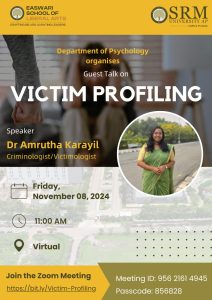 In an era where crime rates and societal concerns about safety have significantly heightened, understanding the psyche of offenders and the dynamics of victimisation has never been more crucial. The Department of Psychology at the Easwari School of Liberal Arts organised an enlightening guest talk delivered by Dr Amrutha Karyil, an expert in Crimes against Women and Children, Victimology, and Victim Assistance. Dr Karyil’s insightful discourse shed light on the complex world of victim profiling, engaging students in a thought-provoking discussion about its historical evolution, methodologies, and ethical dimensions.
In an era where crime rates and societal concerns about safety have significantly heightened, understanding the psyche of offenders and the dynamics of victimisation has never been more crucial. The Department of Psychology at the Easwari School of Liberal Arts organised an enlightening guest talk delivered by Dr Amrutha Karyil, an expert in Crimes against Women and Children, Victimology, and Victim Assistance. Dr Karyil’s insightful discourse shed light on the complex world of victim profiling, engaging students in a thought-provoking discussion about its historical evolution, methodologies, and ethical dimensions.Dr Karyil in her presentation offered a fascinating overview of the history of profiling, tracing its roots back to the Salem Witch Trials and the harrowing case of Jack the Ripper. She elaborated on how profiling serves as a form of behavioural evidence analysis, focusing on the crucial intersection of psychology and criminal investigations. By examining crime scenes, victim backgrounds, and the modus operandi of offenders, profiling seeks to narrow the suspect pool, providing law enforcement with valuable insights into potential perpetrators.
During the talk, Dr Karyil detailed five major types of profiling: psychological, suspect-based, geographical, crime scene, and equivocal death analysis. She stressed that while profiling can be an invaluable investigative tool, it is by no means definitive. Rather, it aids in understanding the underlying patterns of criminal behaviour and assists investigators in their pursuit of justice.
Dr Karyil further explored the broader implications of victim profiling in crime scene analysis. She shared compelling statistics and characteristics of victims targeted by notorious serial killers, urging attendees to recognise the patterns and signatures that often reveal themselves in such cases. The talk underscored the necessity of fostering awareness and specialised training in addressing severe offences, reflecting on the ethical responsibilities that come with careers in forensic psychology.
The event also served as a catalyst for vibrant discussions about the ethical challenges. Students expressed their interest in diverse career paths such as crime scene analysis, offender profiling, and counselling within the criminal justice system. Dr Karyil’s expertise and engaging delivery inspired many to consider how they might contribute to this vital area of society, whether through research, advocacy, or direct service.
Continue reading → - Advancing Next-Gen Networks with MIMO Channel Capacity at 300 GHz November 28, 2024
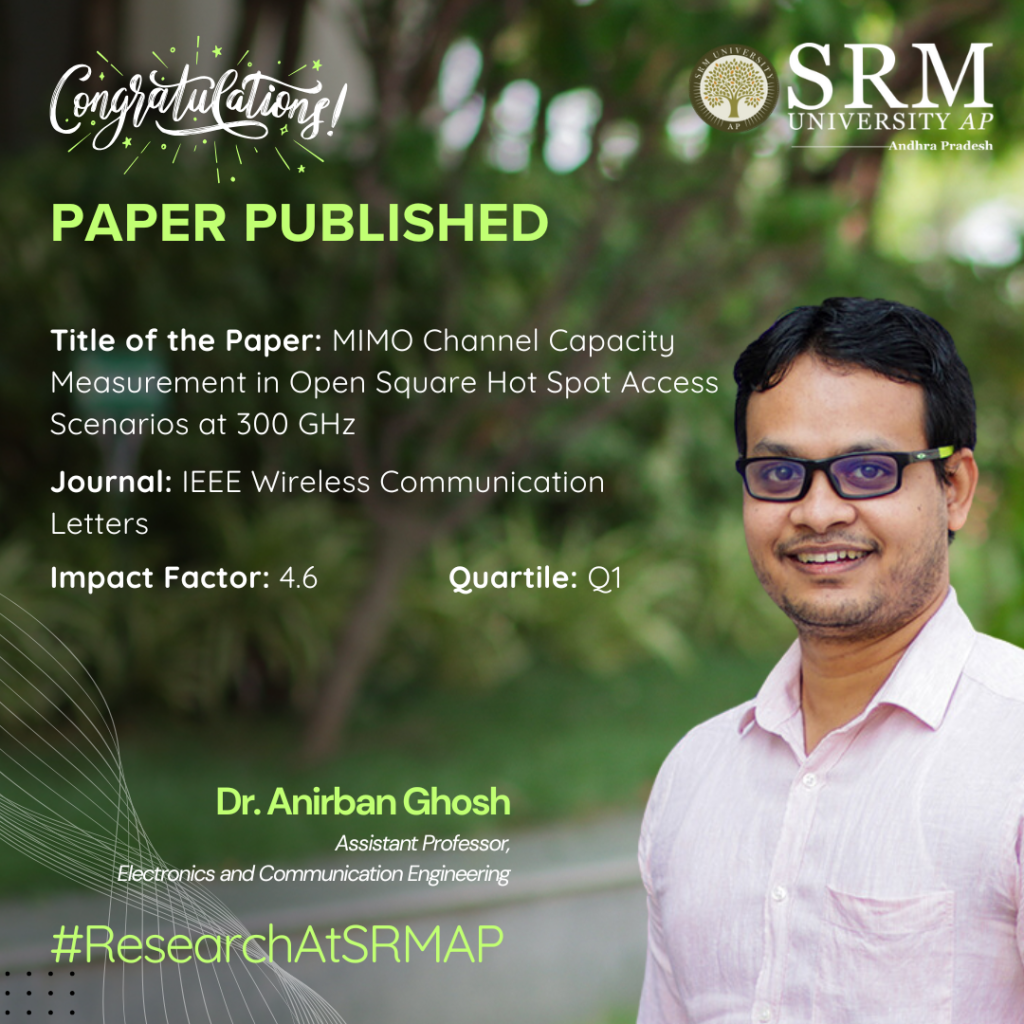
The Department of Electronics and Communication Engineering is pleased to announce the publication of a significant research paper by Dr Anirbhan Ghosh, Assistant Professor, exploring MIMO channel capacity at high frequencies (300 GHz), which holds great potential for beyond 5G and 6G networks. The paper “MIMO Channel Capacity Measurement in Open Square Hot Spot Access Scenarios at 300 GHz” published in the Q1 journal IEEE Wireless Communication Letters, investigates data transmission in three different line-of-sight (LoS) scenarios and contributes to building the next generation of communication networks, which will have a significant positive impact on society by improving connectivity, supporting technological advancements, and promoting economic development.
Abstract
This letter explores the possibility and effectiveness of using multiple communication paths for futuristic outdoor networks, focusing on three scenarios: clear line-of-sight (LoS), partially obstructed line-of-sight (OLoS), and completely blocked line-of-sight (NLoS). A study was conducted at a high frequency of 300 GHz to measure how many useful communication paths are available for transmitting data simultaneously. Based on the results, the average data transmission capacity for these paths was calculated, both with and without the help of passive reflecting surfaces (PRS). The findings show that using multiple antennas significantly boosts the average data capacity, and PRS further enhances this improvement.
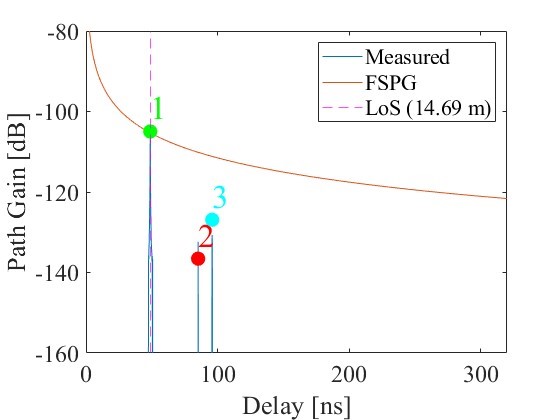
Practical Implementation of the Research
The results align with the design of high-frequency, ultra-high-speed, low-latency, reliable communication envisioned for several futuristic applications beyond 5G and 6G Networks.
Collaborations
Prof. Minseok Kim, Professor, Faculty of Engineering, Course of Electrical and Electronics Engineering, Niigata University, Japan.
Dr Ghosh plans to extend his efforts to other communication scenarios for a similar study. He opines that generating appropriate channel models, coverage design, etc., for the explored scenario would also be an exciting study.
Continue reading → - Dr Rangabhasiyam on Tackling the Issue of Microplastic Pollution November 28, 2024
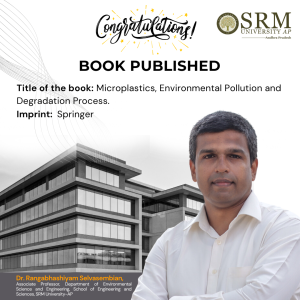 Microplastic pollution is an urgent environmental crisis that threatens ecosystems on land and in water. Addressing this critical issue, Associate Professor and HoD, Dr Rangabhashiyam Selvasembian from the Department of Environmental Science and Engineering has published a groundbreaking book titled Microplastics, Environmental Pollution and Degradation Process with Springer. This book examines the perilous effects of microplastics, their characterisation, and innovative treatment strategies. By integrating the latest research and insights, Dr Selvasembiyan’s work serves as a vital guide for students, researchers, and policymakers committed to combating microplastics and protecting our environment.
Microplastic pollution is an urgent environmental crisis that threatens ecosystems on land and in water. Addressing this critical issue, Associate Professor and HoD, Dr Rangabhashiyam Selvasembian from the Department of Environmental Science and Engineering has published a groundbreaking book titled Microplastics, Environmental Pollution and Degradation Process with Springer. This book examines the perilous effects of microplastics, their characterisation, and innovative treatment strategies. By integrating the latest research and insights, Dr Selvasembiyan’s work serves as a vital guide for students, researchers, and policymakers committed to combating microplastics and protecting our environment.About this Book
This book presents microplastics pollution in land and water bodies, their hazardous effects, characterization approaches, and suitable means of utilizing advanced treatment options to solve the problem. It is mainly understood that microplastic pollutants are associated with water bodies, however there also exists soil contamination and their interaction with the food web. The discussions related to strategies and policies for the management of microplastics are very limited. This book not only narrows microplastic pollution in marine or fresh water bodies, but also takes into account the terrestrial environment, including the toxicity effects, characterization aspects and treatment approaches. The main feature of the book includes latest research related to microplastics pollution, examining the different health effects including environmental (related) issues and highlights the advances in treatment approaches. The book serves as a guide with an up-to-date information on microplastics related problems useful for students, researchers, professionals/environmentalists and also as a reference for policy makers.
Collaborations:
- Professor Ajay Kumar Mishra, Professor – Durban University of Technology, South Africa.
- Dr. Pankaj Raizada, Professor -School of Advanced Chemical Sciences, Shoolini University, Solan (H.P) India.
- Dr Elsayed T Helmy, Researcher – National Institute of Oceanography and Fisheries, Egypt
- Prof. Santhiagu Arockiasamy Professor- National Institute of Technology Calicut, India.
Link to the article: https://doi.org/10.1007/978-981-97-6461-7
Continue reading →


